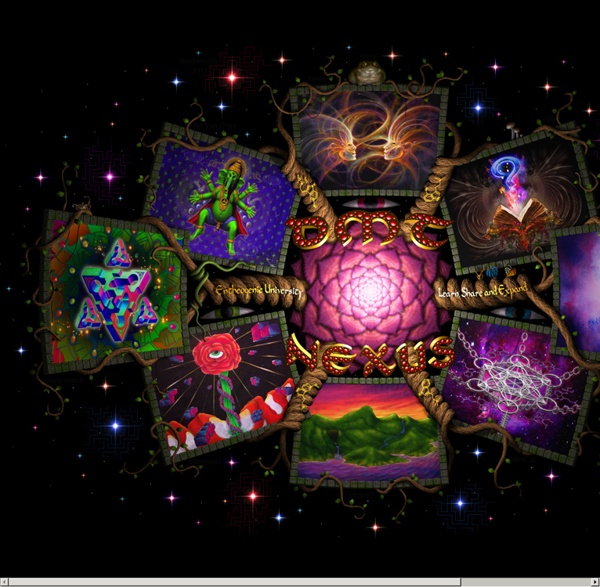



The Jungle Prescription MDMA / Ecstasy rotmg The psychedelic mind expresses coherence and plasticity with all that is. It unifies the spiritual and material with a cosmic glue that sticks and drips with a smiley smile The psychedelic mind expresses coherence and plasticity with all that is. It unifies the spiritual and material with a cosmic glue that sticks and drips with a smiley smile. External Stimuli : www.mars-1.com, MARS 1 flickr Themes : Art Nodes : creamy, dreamy, Mario Martinez, MARS 1, Painting, psychedelic, taffy Synthetic Biology Synthetic biology is the design and construction of biological devices and systems for useful purposes.[1] It is an area of biological research and technology that combines biology and engineering, thus often overlapping with bioengineering and biomedical engineering. It encompasses a variety of different approaches, methodologies, and disciplines with a focus on engineering biology and biotechnology.[2] The advance of synthetic biology relies on several key enabling technologies provided at ever increasing speed and lower cost. DNA sequencing, fabrication of genes, modeling how synthetic genes behave, and precisely measuring gene behavior are essential tools in synthetic biology. Its popularity has grown as a result of increasing developments within DNA synthesis technologies; now it is more affordable to synthesize a gene as opposed to cloning it. History[edit] Let me now comment on the question "what next". Perspectives[edit] Biology[edit] Chemistry[edit] Engineering[edit] Cloning[edit]
untitled Peak experience Origins[edit] Many of the nuances that the term now connotes were expounded by psychologist Abraham Maslow, in his 1964 work Religions, Values, and Peak Experiences.[1] To some extent the term represents Maslow's attempt to "naturalize" those experiences which have generally been identified as religious experiences and whose origin has, by implication, been thought of as supernatural. Maslow (1970) believed that the origin, core and essence of every known "high religion" was "the private, lonely, personal illumination, revelation, or ecstasy of some acutely sensitive prophet or seer" (p. 19). The nature of peak experiences[edit] Maslow describes how the peak experience tends to be uplifting and ego-transcending; it releases creative energies; it affirms the meaning and value of existence; it gives a sense of purpose to the individual; it gives a feeling of integration; it leaves a permanent mark on the individual, evidently changing them for the better. Sustained Peak Experience[edit]
Drugs-forum - Valuable Info Science Says: Lungs Love Weed Breathe easy, tokers. Smoking marijuana in moderate amounts may not be so bad for your lungs, after all. A new study, published in this month's Journal of the American Medical Association, tested the lung function of over 5,000 young adults between 18 and 30 to determine marijuana's effect on lungs. After 20 years of testing, researchers found some buzzworthy results: regular marijuana smokers (defined by up to a joint a day for seven years) had no discernable impairment in lung activity from non-smokers. In fact, researchers were surprised to find marijuana smokers performed slightly better than both smokers and non-smokers on the lung performance test. MORE: 5 Reasons Not to Smoke Synthetic Weed For most of human existence, cannabis has been considered a medicine. Attitudes are changing, however. As marijuana enters the mainstream, studies like the one published in JAMA might dispel false assertions about the plant's deleterious health hazards and promote its medicinal benefits.
Single dose of hallucinogen may create lasting personality change Thursday, September 29, 2011 Psilocybn A single high dose of the hallucinogen psilocybin, the active ingredient in so-called "magic mushrooms," was enough to bring about a measureable personality change lasting at least a year in nearly 60 percent of the 51 participants in a new study, according to the Johns Hopkins researchers who conducted it. Lasting change was found in the part of the personality known as openness, which includes traits related to imagination, aesthetics, feelings, abstract ideas and general broad-mindedness. Changes in these traits, measured on a widely used and scientifically validated personality inventory, were larger in magnitude than changes typically observed in healthy adults over decades of life experiences, the scientists say. "Normally, if anything, openness tends to decrease as people get older," says study leader Roland R. The study participants completed two to five eight-hour drug sessions, with consecutive sessions separated by at least three weeks.
Pharmacology Vaults : Neuropharmacology of Hallucinogens : a technical overview, by BilZ0r (v3.1 Aug 2005) Please note that this subject is extremely technical and this article requires a background in brain science to fully understand. Some definitions of some key terms are included in the Definitions section of this artice. What are hallucinogens? In common usage, the word "hallucinogen" has become a catchall term for a wide variety of psychoactive substances, including such pharmacologically different chemicals as cannabinoids; NMDA receptor antagonists such as ketamine; 3,4-methylenedioxymethamphetamine; kappa-opioid agonists such as salvinorin A, and lysergic acid diethylamide (LSD). In this article, the use of the term "hallucinogen" will be in reference to two groups: chemicals that are chemically and pharmacologically similar to mescaline [the phenethylamine hallucinogens (Shulgin & Shulgin, 1991)] and the chemicals that are chemically and pharmacologically similar to psilocin and LSD [the indole or tryptamine hallucinogens (Shulgin & Shulgin, 1997)]. How do hallucinogens work?